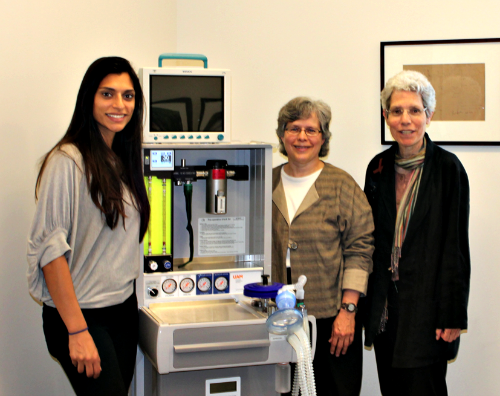
Anaesthesia Champion: 6 Questions for Dr. Jodie Smythe




We first met Dr. Jodie February Smythe, a specialist anaesthetics trainee, year 5 intensive care (currently at Royal Sussex County Hospital in Brighton, United Kingdom), in Mbale, Uganda, where she was working with the Ugandan Maternal and Newborn HUB at Mbale Regional Referral Hospital. She had reached out to us about fundraising for one of our Universal Anaesthesia Machines; serendipitously, Erica and Lina were just about to visit Mbale, and met up with her there. (Mike was actually working with Jodie at the time, which is how we met him)
Later, Dr. Smythe helped connect Mbale Regional Referral Hospital, PONT (a Welsh NGO with strong ties to Mbale), and private donors, who pooled together funds to purchase a machine for the hospital. (We’ve written about the hospital and this process in a recent case study)
She is a remarkably passionate and hard-working anaesthetics trainee, and we chose to profile her as our latest Anaesthesia Champion.
How did you decide to specialize in anaesthesia? Where did you do your training? In the United Kingdom we spend two years doing foundation training, where we experience different specialties as interns. In my second year of foundational training, having rotated in medicine and surgery, I did a placement in Critical Care, which was run by Consultant Intensivists who were all dual-accredited in anaesthesia.
This four-month placement at the Royal Marsden was the reason I chose this career. I had a deep admiration for the bosses and nurses, I loved the fact that everyone was so approachable, without ego, and ‘unflappable’ (and everyone seemed to read the Guardian!). My training has been in London, Oxford and now Brighton, East Sussex.
What do you see as the greatest problem/challenge to providing safe, reliable delivery of anaesthesia in your country or hospital?
Workforce and lack of ICU facilities. In Brighton, as a trauma centre, we often have several things happening at the same time. For example, recently at 11:00pm we had two paediatric cases, a ruptured aneurysm, and an out of hospital arrest. So I completed the paediatric cases whilst my boss came in to start the aneurysm, and I sent my CT1 (core trainee, first year of anaesthesia) to the ED where she remained for several hours whilst they prepared a space is the ICU.
Can you share an interesting story of experience from your time in the hospital that has affected your career or your perspective of healthcare?
I always find it humbling to be involved in organ donation cases. When I worked at Guys and St Thomas’ in London I was involved in the renal transplant list. Usually, it would be a cadaveric or live-related kidney donation, which is an incredible gift. On a couple of occasions, the patient would be what we called an ‘altruistic donor,’ which meant they had walked into a hospital and asked to donate a kidney to any match on the waiting list.
I find organ donation of all types so heartwarming, especially when you manage the patients who are dialysis-dependent and see their day-to-day struggle. Being involved in organ transplantation in a patient whose native organ is failing, and helping to liberate him or her from an extreme of ill health compensates a million-fold for any bad days I may have.
What are your hopes for the future of anaesthesia, surgery, or medicine in your country?
I feel that anaesthesia and surgery need to be better organized and much more efficient. We seem to have to cancel patients quite frequently due to a lack of ward or HDU beds for the post-operative period. I find this heartbreaking, having been a patient on the receiving end of cancellation in the past.
Not only is it grossly unfair for the patient, but it disillusions the staff, has an adverse effect on our training (anaesthetists and surgeons), and is costly.
You’ve spent time in Uganda as well. What brought you to the country, what did you do there, and how did you perceive anaesthesia as a practice and profession in the country?
I went to Uganda because I wanted to work anywhere south of the British Channel, somewhere developing ideally. Fortuitously, I stumbled upon an advert for an Obstetric Anaesthetist role in Mbale, Uganda. I had a career- and life-transforming six months and found the work challenging and trying but very rewarding nonetheless. Predominantly, I was meant to teach, but invariably ended up doing some clinical work through support of the existing staff.
Anaesthesia in Uganda is evolving. I do not know how far it pre-dates UK practice, but we were using ether, had no recovery facilities, and the interns performed caesarians via a vertical incision (as opposed to just above the bikini line, Pfannenstiel incision). Day-to-day practice is done by anaesthetic officers, who generally have a nurse background and study anaesthesia for two years.
Anaesthesia in Kampala, the capital of Uganda is very different, in my opinion, based upon my limited experience of a government hospital in the East of the country. In Kampala, for example, there are many physician anaesthetists who complete postgraduate degrees in Anaesthesia.
I think time will help improve the profile of anaesthesia in Uganda, just as it has in places like the UK. Our college, the Royal College of Anaesthetists became independent of the Royal College of Surgeons as late as 1988. With more and more physician anaesthetists qualifying, the safety and standard of anaesthesia can only advance.
What do you enjoy doing when you’re not working in the hospital? Or, what is what interesting fact we may not know about you?
I am learning to play the saxophone. I fear this may take even longer than my specialty training!